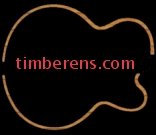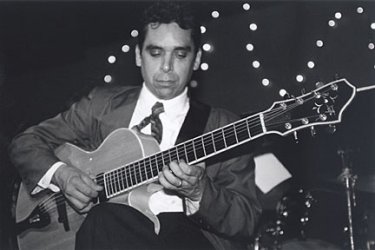
|
Howard Alden |
Bio
Guitarist
Arranger
Conductor
Listen
Gallery
Fun Stuff
Contact
Originally published in the May, 1996 issue of the newsletter of the Cincinnati Jazz Guitar Society.
Howard Alden chooses his words as carefully as he chooses the notes he plays. During our chat, I was struck by how much his speaking resembles his playing - soft spoken, thoughtful, emotional, cliche-free, and direct from the heart.
 |
|
Howard Alden |
I was also struck by the content of the story, which is in many ways a classic American jazz tale: a 10 year old kid takes some banjo lessons, becomes inspired, begins practicing and through hard work, dedication and talent becomes a well established name in the world of jazz.
Howard, 37, began playing the tenor banjo at age 10. He studied with a retired banjo player who taught him to read and also taught him many old tunes. A few years later, he took up the guitar and began listening to Barney Kessel, Tal Farlow and the other jazz guitarists of the day. In his teens, he attended a Howard Roberts guitar seminar, and then attended the group classes that Howard Roberts held that evolved into GIT. He studied at GIT during the first year of its existence, and after that year stayed on as a teacher/assistant.
Howard's first professional gig was as a banjo player working in pizza parlors in Southern California. He says of being a 12 year old professional banjo player "I was a curiosity". From those humble, pepperoni and mushroom covered beginnings, Howard's career slowly grew to the point where his resume includes work with Ruby Braff, Clark Terry, Dizzy Gillespie, George Van Eps, Joe Williams, Woody Herman, Flip Phillips, Charlie Byrd, and many others.
We were chatting about his recent recording with fellow guitarists Jimmy Bruno and Frank Vignola when the following question came up.
TB: The tightness of the ensemble is a major issue when putting together a guitar ensemble. Could you shed some light on what it takes to put that together verses what a group of sax players who have been playing in sections for years would have to do? Did you have more work or less?
HA: Maybe a little more. Guitarists, although they've got millions of techniques at their disposal, it's not something that guitarists do often so they're not used to phrasing together. Everybody has different picking techniques. Everybody has a slightly different sound. Of course you can say the same thing for saxophones. It's something that I got used to doing because I play with a lot of different horn players. I tailor my sound when I do parts with them, whereas not only do you attack the note at the same time, but you end it at the same time.
Fortunately, Jimmy and Frank are so fast, they're both brilliant players. We spent a fair amount of time rehearsing. Before we recorded the album, we had a week long gig at Yoshi's in California in Berkeley. So we had a week of performance as well as rehearsal.
Once you get used to playing that way , once you get to listening to all the other players around you, once you get in the habit of doing that, it comes together pretty easily. It's just a matter of thinking that way.
TB: I've found that because the attack of a note on the guitar is so sharp, the slight differences in timing show up so much more than for wind instruments.
HA: Definitely. And the other thing is that horn players are blowing the horn, so they can sustain a note a certain length of time and then end it. Whereas guitarists, everybody's guitar has a different decay rate, particularly jazz guitarists who are usually acoustic so the note won't sustain quite as long, depending on the guitar we have. So it's something we have to compromise with.
TB: What's the worst gig you've ever had? For example, I worked at Kings Island when I was in college and wore a pink tuxedo and played a white guitar in a 50's show.
HA: Believe me, I've done my share of that. I did play at Disneyland for a couple years when I was 17 and 18, and that was your normal Disneyland costume gig with white pants and red jacket and name tag and all that. But other than that, I don't know. There have been so many of them, where do I begin? (Laughs) I've played in front of Macy's in a Santa Claus suit in the middle of winter. Looking back on them, they seem kind of funny, but of course they were with other good musicians, and we were just trying to do a gig and get through it somehow.
When I moved to New York, I deliberately wanted to stay out of the club dates, wedding, casuals, and conventions. So if I wasn't doing a nice jazz gig, I would take these gigs on the banjo. I figured I'd rather be playing traditional jazz or dixieland than schlocky, mediocre club date music. I'm sort of glad I did that, but it did put me in a lot of funny costume gigs.
TB: When was the last time you had to take a bad gig?
HA: I'm glad to say it's been a long time - a very long time. For the past 5 or 6 years, all the gigs I've played, I could hardly wait to get there and play because they are all good music, good situations. I'm probably deliberately forgetting some, because I'm sure there have been a few. But for the most part, I feel very lucky.
TB: What is your opinion of jazz critics?
HA: Naturally, I get offended when they say something I don't agree with. I think we all do. But, I think everyone's entitled to their opinion, as long as they make it clear that it's their opinion. The only time that critics bother me is when they spend most of the time trying to find negative things to say. Everybody has a different perception and opinion about different things. I think the best critics down through the years are the ones who can accurately report something and describe it to the person who's reading so they can get an idea of what it's about, and let the reader decide whether they like it or not or whether they're interested.
Occasionally you run into one who wants to just vent his own personal opinions or frustrations and they can do a lot of damage to someone, rather than helping that person and music in general. On the other hand, most jazz critics are pretty supportive when you compare them to theatrical critics who can close a huge Broadway production with one bad review. And most jazz critics are fans of the music and in most cases they are part time musicians themselves, so they at least have an accurate feel and some basis for having an opinion.
TB: Can you give us your view of the relationship between the muscles in your hands, the mental knowledge you have of the tune, and your artistic expressions when you are playing?
HA: I really don't think of the muscles in my hand at all. That fortunately takes care of itself. I either play enough or practice enough that there's no problems there. When I'm playing tunes that I'm very familiar with, that I've been playing for years, I don't have to think too much consciously, mentally of either what chord is coming next or what notes I'm going to pick out to play over that. The harmony and the melody are so ingrained that I can basically just try to create motifs and ideas and phrases over the chord changes or over the melody. When I'm playing a tune I'm not quite as familiar with I have to fall back on intellectual devices like I'll try this particular chord superimposed over this one here.
It's a combination of all the above. Ideally, when you're playing your best, you're not really thinking about much of anything and the ideas are just hopefully kind of flowing effortlessly and there's no technical barriers to what you're playing. Occasionally there is. You're trying to play an idea or a phrase and you get hung up somewhere physically or mentally. You'll have to stop and regroup and try something else. But basically it's just a matter of exploring the ideas and trying different things. Sometimes you get some pleasant surprises and sometimes not.
TB: Most people, when deciding what is "good" in music, do not distinguish between "what is good" and "what I like". How do you define what is good when you hear someone play?
HA: Of course it's going to be colored by your opinion of what you like. I try to take a lot of things into consideration. I like to consider their technical ability on the guitar, because that's something that takes a lot of work and I respect. And I try to consider if they're trying to play honestly. I guess that's the main thing that I look for - honesty or sincerity in playing. Even if it's a style I don't necessarily want to play myself, but if a player really seems sincere and honest and has some integrity in their playing, that means a lot to me, whether it's a rock player or a country player or a jazz player.
I do hear jazz players who are just going through the motions in some parts. They're playing something and then they go ahead and play a certain lick and it sounds to me like they're doing it just cause they think they should or just because or just because they're going to show that they know this particular lick, rather than that it has anything to do with the song or the music they're playing.
It's one thing to play something because they think it's going to make a really beautiful or interesting musical statement and another thing to play something just to say "Look at me play this lick. I'm really hot shit on the guitar".
TB: Do you have any advice I can pass along to the players who will be accompanying you when you come to Cincinnati?
HA: Not really. I hesitate to say anything to drummers or bass players. Because I have found that if people start talking to them and giving them ideas of what to do, that makes them more self conscious and limits them. I have enough faith in their ability that they're probably going to contribute something I didn't expect to the performance. Especially when you're getting together for a one-nighter, I find that suggestions are more limiting.
© 2002 - 2016, Tim Berens
All rights reserved